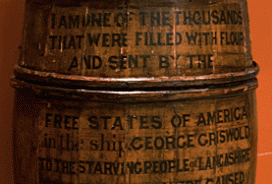In Greater Manchester
- How money from slavery made Greater Manchester
- The importance of cotton in north west England
- The Lancashire cotton famine
- Smoking, drinking and the British sweet tooth
- Black presence in Britain and north west England
- Resistance and campaigns for abolition
- The bicentenary of British abolition
Global

Cotton famine flour barrel
The American Civil War and the Lancashire cotton famine
The American Civil War impacted on the livelihood of thousands of textile workers in the north west of England through their connections with the supply of slave-grown cotton.
Although slavery was finally abolished in British colonies of the Caribbean, Ceylon (now Sri Lanka), Canada and Cape Town
The American Civil War (1861-1865) was fought largely over the issue of slavery. The fighting was between the states in the ‘Union’ north and 11 states in the ‘Confederate or rebel' south who wanted to separate from the rest of the USA and continue the system of slavery that was so important to their plantation economies.
Enslaved Africans who had escaped to free northern states could be captured and returned to their previous owners. Many such people, for example, William Wells Brown, Henry Box Brown, Frederick Douglass and Harriet Jacobs, came to Britain to campaign against slavery in America.
Anti-slavery activity was increasing and President Abraham Lincoln was determined to bring an end to slavery. The north blockaded southern ports so goods could not be brought in or out. This meant the export of raw slave-grown cotton dried up. Liverpool traders also suspended trade waiting for prices to increase. This led to the ‘Lancashire cotton famine’ (1862-1863) which was a period of great hardship in the north west of England.
Many thousands of Lancashire mill workers lost their jobs. However, in the face of unemployment and poverty, many people in the Greater Manchester region as well as local politicians, such as John Bright and Richard Cobden, still supported Lincoln’s fight against slavery.